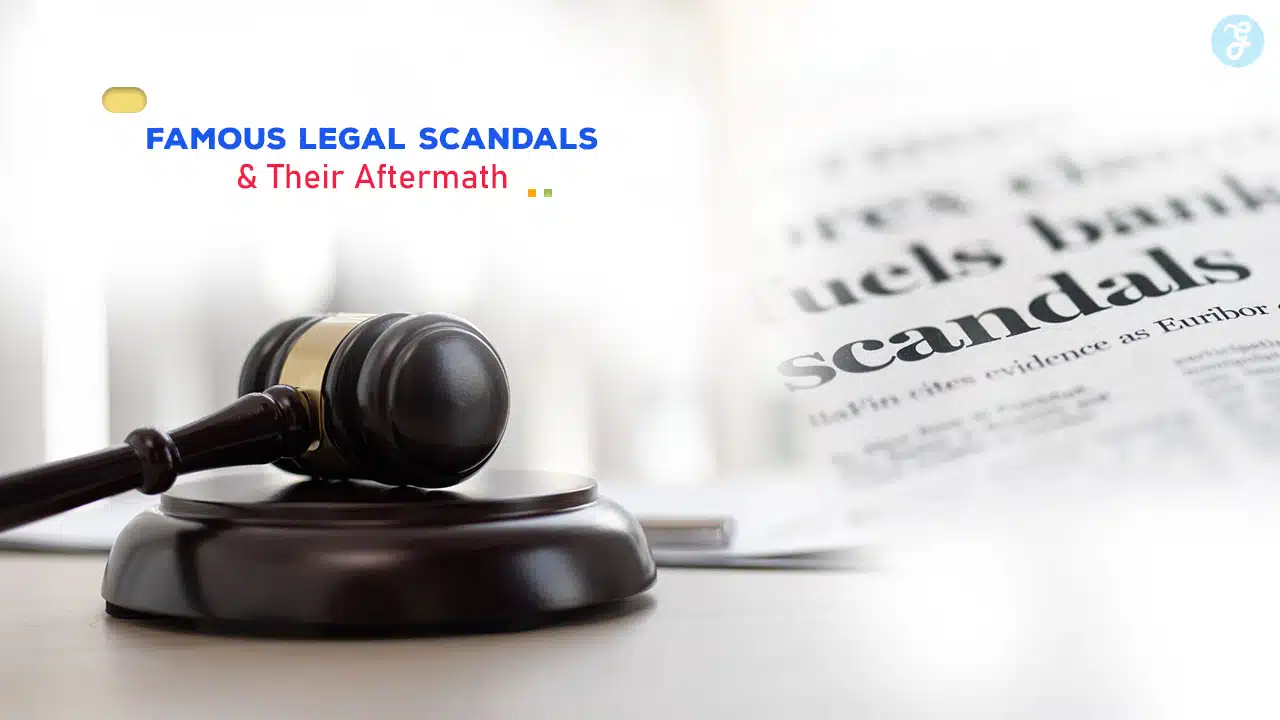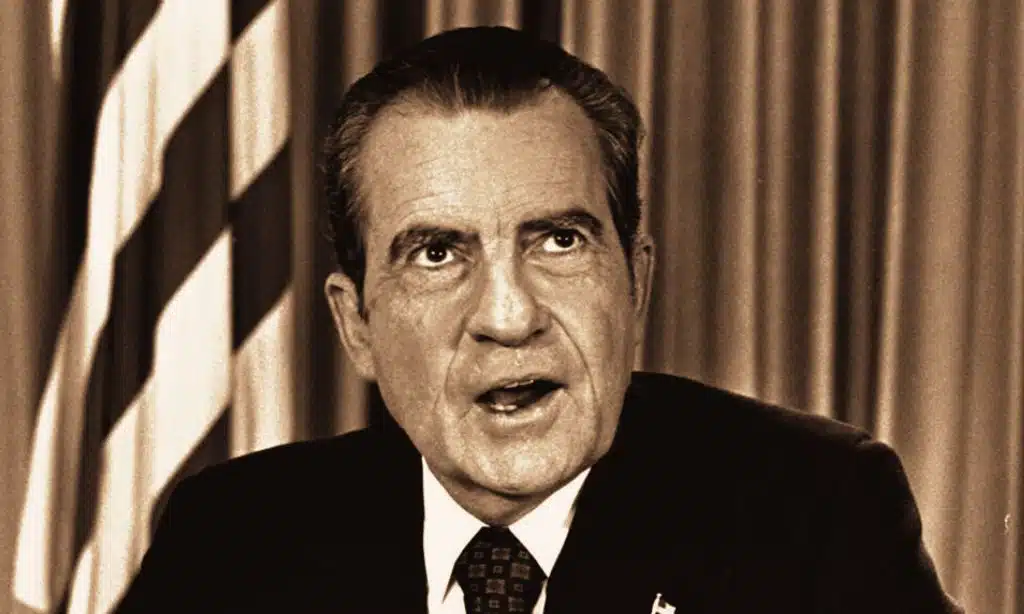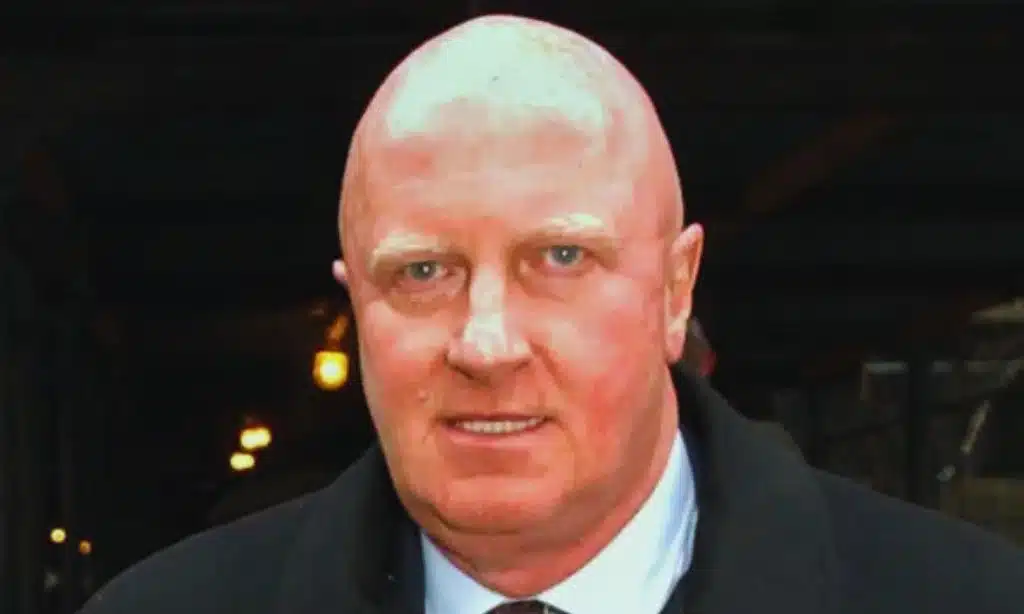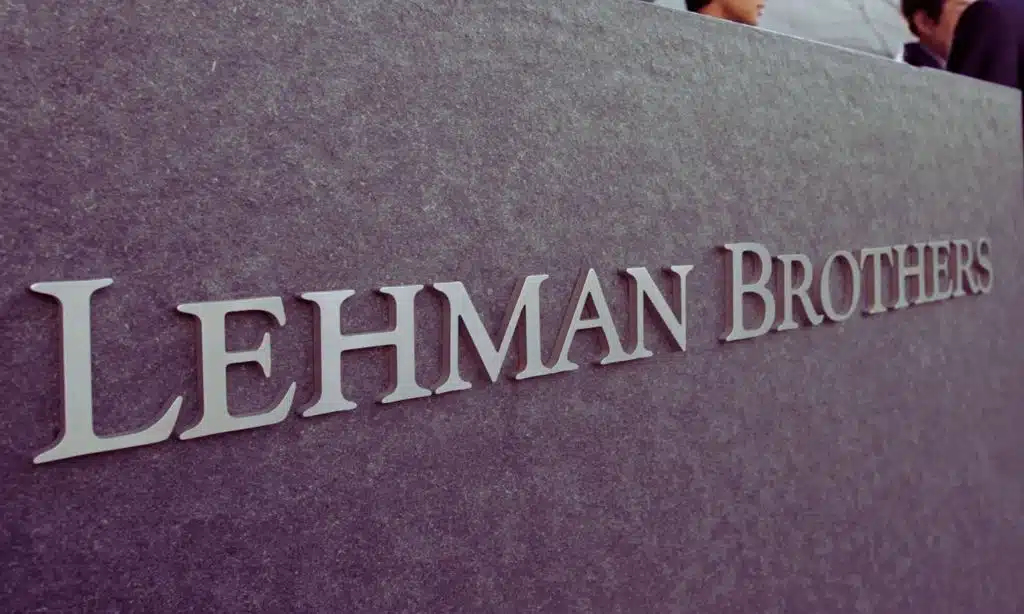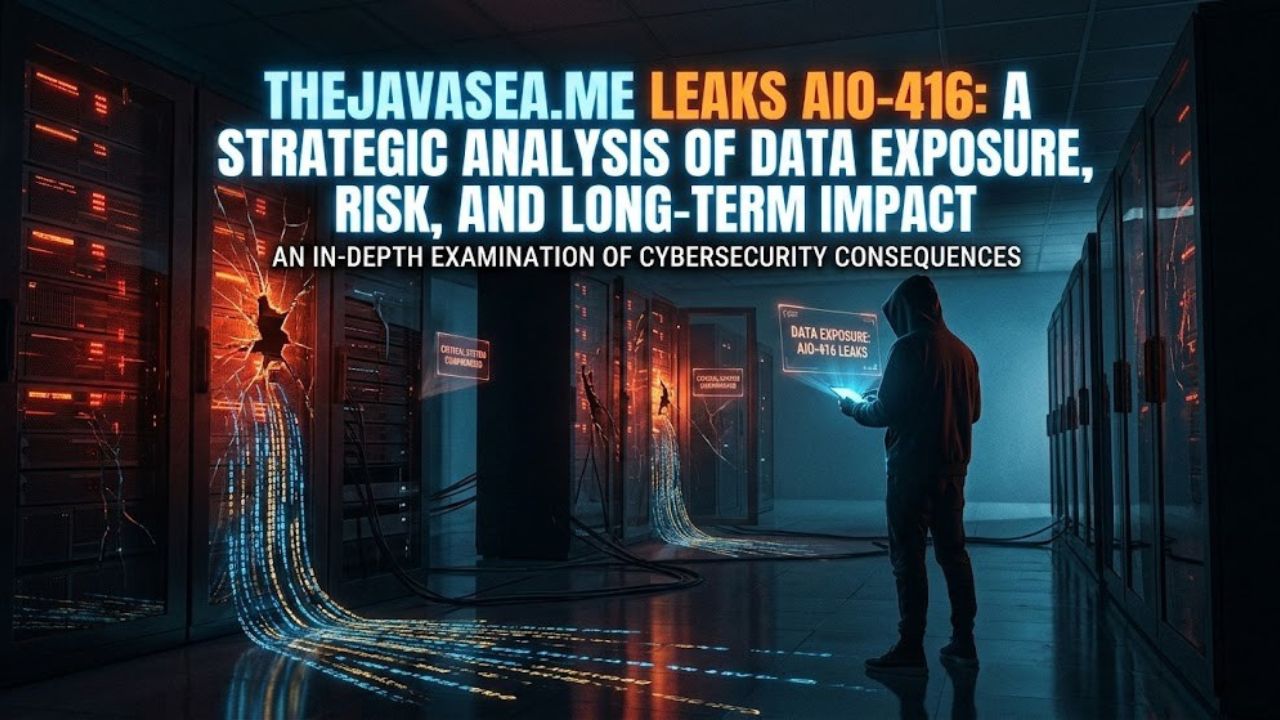From political corruption to corporate fraud and high-profile criminal cases, certain legal scandals leave an indelible mark on society.
These cases spark widespread debates, expose societal flaws, and often lead to lasting changes in laws, corporate governance, and social policies.
Let’s explore 18 famous legal scandals in detail, breaking down the events that shocked the world and how their aftermath continues to influence us today.
1. The O.J. Simpson Trial
O.J. Simpson’s 1995 trial became a cultural phenomenon, revealing complexities around race, media, and the justice system.
- Historical Context & Background
Simpson, an NFL Hall of Famer and cultural icon, was charged with the murders of his ex-wife, Nicole Brown Simpson, and her friend, Ron Goldman. Given his celebrity status and the racial tensions of the time, the case was primed to capture national attention. Early 1990s Los Angeles had been deeply impacted by the Rodney King beating and subsequent riots, setting the stage for polarized reactions. - Courtroom Drama & Media Frenzy
This trial was among the first to be televised daily, with every detail dissected by the public. Key pieces of evidence included DNA samples and a bloody glove, while Simpson’s defense team leveraged doubts around the LAPD’s credibility, particularly amid allegations of racial bias from detective Mark Fuhrman. The infamous line “If it doesn’t fit, you must acquit” became part of American vernacular. - Long-Term Impact
Despite the acquittal, civil suits later held Simpson liable. The trial highlighted racial divides in America and the influence of wealth in securing legal representation. The case emphasized the need for reforms in evidence handling and contributed to popularizing forensic science. Public interest in high-profile trials surged, influencing future media coverage of courtroom events.
2. The Watergate Scandal
The Watergate scandal rocked American politics and introduced new standards for political accountability and media’s role in government oversight.
- Break-in and Cover-up
In June 1972, five men associated with President Nixon’s re-election campaign were arrested for breaking into the Democratic National Committee headquarters. What appeared to be a minor burglary quickly escalated as journalists Bob Woodward and Carl Bernstein uncovered a widespread cover-up, implicating top White House officials and Nixon himself. - Nixon’s Resignation
Nixon’s administration engaged in illegal wiretapping, sabotage of political opponents, and hush money payments. Facing almost certain impeachment, Nixon became the first president in U.S. history to resign, on August 8, 1974. His resignation speech was broadcast to the nation, and Vice President Gerald Ford assumed the presidency shortly after. - Aftermath & Reforms
Watergate led to the Ethics in Government Act, creating new standards for transparency and ethics among federal employees. Additionally, it spurred campaign finance reform, inspiring laws to limit political donations. The scandal solidified investigative journalism’s role as a governmental watchdog and highlighted the need for separation of power to check executive authority.
3. The Enron Scandal
The Enron scandal was a major corporate fraud case that exposed loopholes in accounting standards, leading to significant corporate governance reforms.
- Corporate Fraud Uncovered
Enron, once America’s seventh-largest company, used accounting loopholes and shell companies to conceal billions in debt. Executives manipulated financial reports to falsely inflate stock prices. When Enron declared bankruptcy in December 2001, thousands of employees lost jobs, and shareholders lost billions. - Legal Proceedings
Enron’s CEO Jeffrey Skilling and Chairman Kenneth Lay faced charges including fraud and insider trading. Arthur Andersen, Enron’s auditing firm, was implicated in shredding documents related to the investigation, leading to its own collapse. - Long-Term Impact on Corporate Law
The scandal led to the Sarbanes-Oxley Act, imposing stricter regulations on financial reporting and requiring CEO certification of financial statements. It also reshaped accounting practices, emphasizing transparency and stricter auditing standards, and highlighting the importance of ethical leadership in corporate culture.
4. The Clinton-Lewinsky Scandal and Impeachment
President Bill Clinton’s impeachment trial, driven by personal indiscretions, brought questions of morality, power, and public accountability into sharp focus.
- The Affair and Perjury Allegations
Clinton’s affair with Monica Lewinsky, a White House intern, became public during a sexual harassment lawsuit filed by Paula Jones. Clinton’s denial under oath led to accusations of perjury and obstruction of justice. The House of Representatives initiated impeachment proceedings in 1998, leading to a nationally broadcast trial in the Senate. - Media Impact and Public Opinion
The media frenzy around the scandal marked a shift in how news covered the personal lives of public figures. Clinton’s trial highlighted deep divisions in American society regarding moral standards for elected officials. While the Senate ultimately acquitted him, the trial underscored tensions between privacy rights and public accountability for officials. - Legacy of the Scandal
The scandal led to heightened awareness of workplace ethics, especially concerning power dynamics. It also foreshadowed future scrutiny of political leaders’ personal lives. Clinton’s approval ratings remained high throughout the trial, illustrating a growing tolerance for separating personal flaws from professional performance among the American public.
5. The Martha Stewart Insider Trading Scandal
Martha Stewart’s insider trading scandal illustrated the consequences of financial misconduct and brought visibility to corporate accountability in the early 2000s.
- The Case Against Stewart
Stewart sold shares of ImClone Systems stock in 2001 after receiving non-public information from her broker, who knew that the FDA would not approve an ImClone drug. Her actions resulted in charges of conspiracy, obstruction of justice, and making false statements to investigators. - Trial and Public Backlash
Despite her defense, Stewart was convicted and sentenced to five months in prison, making her one of the few high-profile public figures to face jail time for financial misconduct. The case underscored the importance of transparency in financial markets and the potential consequences of leveraging privileged information. - Aftermath and Broader Implications
Stewart’s conviction highlighted the need for more robust insider trading regulations and showed that even high-profile individuals could face consequences for ethical violations. The scandal raised public awareness of insider trading laws and reinforced the SEC’s role in protecting market integrity.
6. The Rodney King Case and Los Angeles Riots
Rodney King’s beating by LAPD officers and their subsequent acquittal ignited widespread protests and underscored the urgency of police reform.
- Incident and Initial Reaction
In 1991, Rodney King, an unarmed African American man, was beaten by four Los Angeles police officers after a high-speed chase. The incident, captured on video, sparked outrage and led to a highly publicized trial. Despite clear evidence, the officers were acquitted in 1992, which many viewed as a miscarriage of justice. - The L.A. Riots
Following the acquittal, Los Angeles erupted in riots, resulting in 63 deaths, thousands of injuries, and significant property damage. The riots brought national attention to racial inequalities and police brutality in the U.S. - Impact on Policing and Civil Rights
The King case highlighted systemic racial biases in law enforcement, prompting reforms in police training and practices. The case also fueled the push for community policing and the establishment of civilian oversight committees to investigate allegations of police misconduct, setting a precedent for later reforms.
7. The Tyco International Scandal
The Tyco scandal showcased how corporate executives could exploit their power, leading to heightened scrutiny of executive compensation and corporate oversight.
- Lavish Lifestyle and Fraud Allegations
Tyco’s CEO Dennis Kozlowski and CFO Mark Swartz were accused of embezzling millions from the company to fund extravagant personal expenses. Their actions included unauthorized bonuses and other financial misdeeds that shocked the corporate world. - Court Proceedings and Conviction
Both Kozlowski and Swartz were convicted on charges of grand larceny, conspiracy, and securities fraud, serving time in prison. The case brought attention to ethical issues surrounding executive compensation. - Aftermath and Reforms
Tyco implemented strict governance measures to prevent similar misconduct. This scandal furthered the call for transparency in executive pay and spurred broader reforms in corporate governance, encouraging companies to adopt stricter controls and improve accountability.
8. The Ford Pinto Case
The Ford Pinto case highlighted corporate negligence, showing how companies sometimes prioritize profits over consumer safety.
- Deadly Design Flaw
The Ford Pinto, a popular compact car in the 1970s, had a poorly designed fuel system that could ignite in rear-end collisions. Despite being aware of the defect, Ford delayed recalling the cars, performing a cost-benefit analysis that valued legal settlements over the cost of a recall. - Public Outcry and Lawsuits
After several fatal accidents, Ford faced lawsuits and was criticized for neglecting safety in favor of profits. The case brought nationwide attention to product safety standards. - Long-Term Implications
The Pinto case underscored the importance of corporate responsibility in consumer safety, leading to stricter safety standards. It reshaped corporate ethics, urging companies to prioritize consumer well-being over cost-saving measures and reinforcing the role of regulatory agencies.
9. The Casey Anthony Trial
The Casey Anthony trial became one of the most scrutinized criminal cases, sparking debates about media influence and public opinion in legal proceedings.
- Tragic Disappearance and Trial
In 2008, Casey Anthony was accused of murdering her two-year-old daughter, Caylee. Despite circumstantial evidence suggesting guilt, including inconsistencies in her stories, a jury acquitted Anthony in 2011, shocking the public. - Media Coverage and Public Outrage
The trial became a media spectacle, with public opinion strongly divided. News channels provided non-stop coverage, and many people felt the media’s portrayal swayed public perception before the verdict. - Aftermath and Legal Changes
The case inspired “Caylee’s Law,” requiring parents to report a missing child promptly. It also raised questions about the fairness of trials in high-profile cases, highlighting the potential for media bias to influence legal proceedings.
10. The Jeffrey Epstein Case
Jeffrey Epstein’s scandal revealed shocking abuses of power and highlighted systemic issues in the criminal justice system’s handling of high-profile cases.
- Dark Secrets and High-Profile Connections
Epstein, a financier with ties to powerful figures, was accused of running an extensive sex trafficking ring involving minors. His 2019 arrest and subsequent death in prison sparked conspiracy theories and public suspicion, particularly due to his connections with influential people. - Public Reaction and Institutional Scrutiny
Epstein’s case attracted global attention, with calls for investigations into possible accomplices and scrutiny over the preferential treatment he previously received. Epstein’s death raised questions about prison security, transparency, and accountability in handling sensitive cases. - Legal and Cultural Impacts
Epstein’s case brought renewed attention to human trafficking and exploitation, amplifying calls for legal reforms. It also fueled discussions about the responsibilities of wealth and power, and how they can shield individuals from accountability, spurring stronger policies for protecting victims.
11. The Lance Armstrong Doping Scandal
Lance Armstrong’s doping scandal was a monumental case that revealed the extent of performance-enhancing drug use in professional sports, especially cycling.
- Background and the Rise of a Legend
Lance Armstrong was celebrated not only for his seven Tour de France wins but also for his survival story as a cancer survivor. Armstrong’s victories symbolized perseverance, earning him millions of fans and lucrative sponsorships. Over the years, rumors of doping persisted, but he strongly denied them. - The Investigation and Armstrong’s Admission
After years of investigation by the United States Anti-Doping Agency (USADA), Armstrong was stripped of his titles in 2012. The investigation revealed that Armstrong had used banned substances throughout his career and was involved in an elaborate doping scheme. In a 2013 televised interview with Oprah Winfrey, he finally admitted to doping, shocking fans and tarnishing his legacy. - Impact on Sports Regulations and Public Perception
Armstrong’s scandal led to stricter anti-doping regulations, including enhanced testing procedures and greater scrutiny of athletes’ medical records. This case fueled the establishment of more rigorous checks within professional sports to prevent doping, and it also brought lasting changes to how sports figures are perceived and trusted by the public.
12. The Catholic Church Abuse Scandal
The Catholic Church abuse scandal is one of the most extensive and damaging institutional scandals, revealing decades of abuse by clergy members and a long-standing cover-up.
- Background and Scale of the Abuse
Starting with reports in the 1980s and escalating in the 2000s, numerous cases of child sexual abuse by Catholic priests were reported across the world, with high concentrations in the U.S., Ireland, and Australia. Investigations uncovered that church officials had repeatedly covered up abuse, often moving accused priests to different parishes instead of reporting them. - Legal Cases and Institutional Response
Thousands of lawsuits were filed, leading to hundreds of millions of dollars in settlements paid to victims. The scandal forced the Catholic Church to reevaluate its policies, resulting in changes to how allegations are handled, as well as compensation for survivors. - Aftermath and Broader Implications
This scandal led to widespread criticism of the Church’s practices, calls for greater accountability, and increased advocacy for abuse survivors. In many regions, it also prompted changes to laws regarding the mandatory reporting of abuse and placed a spotlight on the power and influence of religious institutions in handling internal misconduct.
13. The FIFA Corruption Scandal
The FIFA scandal exposed deep-rooted corruption within soccer’s governing body, implicating high-ranking officials in bribery and kickback schemes.
- Revelation of Corruption
In 2015, the U.S. Department of Justice indicted several FIFA officials on charges of corruption, money laundering, and bribery related to World Cup hosting rights and media contracts. The scandal revealed that officials had taken bribes to award hosting rights to countries willing to pay millions, significantly tarnishing FIFA’s reputation. - Court Cases and Resignations
Many FIFA officials faced trials and were convicted or entered plea deals. Sepp Blatter, FIFA’s president at the time, was suspended and eventually banned from soccer activities. - Long-Term Impact
The scandal led to increased pressure for reform within FIFA, with new regulations focusing on transparency and ethics in awarding tournament hosting rights. It raised awareness of the need for accountability in international sports organizations, sparking changes in governance structures and policies to prevent similar corruption.
14. The Lehman Brothers Collapse
The fall of Lehman Brothers played a pivotal role in the 2008 financial crisis, revealing the fragility of the banking system and the risks of unchecked financial speculation.
- Background and Rise of Lehman Brothers
Lehman Brothers was one of the largest investment banks in the United States, deeply involved in mortgage-backed securities. As the housing market bubble burst, the bank was left holding large quantities of toxic assets, eventually declaring bankruptcy in September 2008. - Legal and Economic Consequences
The collapse sent shockwaves through global markets, leading to the worst economic downturn since the Great Depression. Legal proceedings followed, with multiple lawsuits filed against Lehman executives for misleading investors and misrepresenting financial stability. - Impact on Financial Regulations
In response to the crisis, the U.S. government passed the Dodd-Frank Wall Street Reform and Consumer Protection Act in 2010, introducing strict new regulations to increase oversight of banks and prevent high-risk lending practices. The scandal emphasized the need for financial transparency and risk management.
15. The Bernie Madoff Ponzi Scheme
Bernie Madoff’s Ponzi scheme was the largest financial fraud in history, defrauding investors of over $65 billion and shaking public trust in the financial industry.
- The Scheme and Its Exposure
Madoff, a respected financier and former chairman of NASDAQ, orchestrated a Ponzi scheme where new investors’ funds were used to pay returns to existing investors, giving the illusion of profitability. The scheme collapsed during the 2008 financial crisis when investors attempted to withdraw funds Madoff didn’t have. - Legal Proceedings and Sentencing
In 2009, Madoff was sentenced to 150 years in prison, serving as a stark warning against financial fraud. His conviction spurred regulatory agencies to tighten their scrutiny of investment advisors. - Aftermath and Changes in Financial Oversight
Madoff’s scheme exposed significant weaknesses in the oversight of investment firms. The scandal led to reforms, including stricter regulations for the Securities and Exchange Commission (SEC) and more stringent auditing processes to protect investors from similar schemes.
16. The BP Deepwater Horizon Oil Spill
The Deepwater Horizon oil spill was one of the largest environmental disasters, highlighting the risks of offshore drilling and sparking new environmental regulations.
- Incident and Environmental Impact
In April 2010, the Deepwater Horizon oil rig, operated by BP, exploded, releasing millions of barrels of oil into the Gulf of Mexico. The spill caused extensive environmental damage, affecting marine and wildlife habitats, and devastating local economies dependent on fishing and tourism. - Legal Settlements and Corporate Accountability
BP faced numerous lawsuits, resulting in billions in penalties and compensation for affected businesses and communities. The company’s response was criticized for being slow and inadequate. - Regulatory Reforms and Environmental Awareness
The disaster led to stricter safety regulations for offshore drilling, including increased inspection requirements and emergency response planning. It underscored the importance of environmental accountability and pushed corporations to prioritize ecological safety.
17. The Theranos Scandal
Theranos, once a Silicon Valley darling, fell into infamy after its fraudulent blood-testing technology was exposed, leading to legal consequences and a broader discussion about startup ethics.
- Rise and Fall of Theranos
Led by CEO Elizabeth Holmes, Theranos promised revolutionary blood tests requiring only a small sample, attracting billions in investments. However, investigative reporting revealed that the technology was faulty, and the company had misled investors, patients, and regulators. - Legal Proceedings and Conviction
Holmes and former COO Ramesh “Sunny” Balwani were charged with fraud, with Holmes found guilty in 2022. The case highlighted how Silicon Valley’s “move fast and break things” culture could result in life-threatening consequences for patients. - Impact on Startup Culture
The scandal prompted regulatory bodies to increase oversight of medical startups, focusing on the importance of scientific integrity. It also raised awareness about due diligence in venture capital, pushing investors to verify claims before funding healthcare innovations.
18. The R. Kelly Sexual Abuse Scandal
- Kelly’s case, spanning decades of abuse allegations, became a pivotal moment in the music industry’s reckoning with sexual misconduct and abuse of power.
- Allegations and Initial Trials
Since the early 2000s, R. Kelly faced numerous allegations of sexual abuse, particularly involving underage girls. While he was initially acquitted in a 2008 trial, renewed scrutiny from the “Surviving R. Kelly” documentary series brought his abuses back into the public eye, leading to new charges. - Convictions and Industry Impact
In 2021, R. Kelly was found guilty on charges including racketeering and sex trafficking, receiving a lengthy prison sentence. The case highlighted the complicity of people around him who enabled his behavior, sparking a wider industry conversation about accountability. - Broader Cultural Implications
Kelly’s conviction bolstered the #MeToo movement within the music industry, leading to new protocols for reporting abuse and stronger protections for young artists. The case underscored the need for systemic change, encouraging survivors of abuse to come forward and inspiring a reassessment of industry practices.
Takeaway: The Legacy of Legal Scandals on Modern Society
These 18 cases exemplify how legal scandals can have profound, lasting effects on society, impacting laws, ethics, and public trust.
Each case challenged the status quo, exposing vulnerabilities in legal and corporate structures and influencing generations of policies and societal attitudes.
From changes in corporate governance and accountability to increased awareness of environmental and social justice issues, these scandals highlight the evolving relationship between society and the law, reminding us of the enduring importance of transparency, accountability, and reform.
Each scandal has shaped modern society, underscoring that even the most shocking events can lead to progress when society chooses to confront and learn from them.


